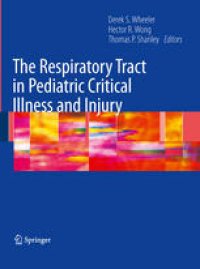
Ebook: The Respiratory Tract in Pediatric Critical Illness and Injury
Author: Howard E. Jeffries MD MPH MBA (auth.) Derek S. Wheeler Hector R. Wong Thomas P. Shanley (eds.)
- Tags: Intensive / Critical Care Medicine, Pediatrics, Pneumology/Respiratory System, Infectious Diseases
- Year: 2009
- Publisher: Springer-Verlag London
- Edition: 1
- Language: English
- pdf
The field of critical care medicine is in the midst of a dramatic change. Technological and scientific advances during the last decade have resulted in a fundamental change in the way we view disease processes, such as sepsis, shock, acute lung injury, and traumatic brain injury. Pediatric intensivists have been both witness to and active participants in bringing about these changes and it is imperative that all physicians caring for critically ill children in this new era have a thorough understanding of the applicability of these modern developments to the care of patients at the bedside and to keep up with the rapidly evolving field of critical care medicine.
The respiratory system is unique in that it is constantly exposed to a barrage of foreign substances from both the internal and external environment. Many diseases affect the pediatric respiratory system, a large number of whom are not associated with acute respiratory failure. Nevertheless, these constitute a major portion of the practice of pediatric critical care medicine and can account for significant morbidity and mortality. The Respiratory Tract in Pediatric Critical Illness and Injury has been written by an international panel of experts to provide an in-depth review of respiratory disease in the critically ill or injured child. This book is therefore an ideal reference for all involved in the management of the pediatric critically ill patient, from physicians, residents and fellows in critical care, pulmonology, and cardiology, and pediatricians to specialist nurses and support personnel on the pediatric intensive care unit and all medical professionals who are involved in the management of these patients.
The principal role of the respiratory system is to permit effi cient exchange of respiratory gases(O2 and CO2) with the environment. The respiratory system is unique in that it is constantlyexposed to a barrage of foreign substances from both the internal environment (at any one pointin time, approximately one-half of the cardiac output is received by the lungs) and the externalenvironment (with each breath, the respiratory tract is exposed to pollens, viruses, bacteria,smoke, etc). According to the Centers for Disease Control and Prevention, diseases of the respiratorysystem were the seventh and eighth leading causes of deaths in children aged 1 to 19 yearsin 2003 [1]. Dr. George A. Gregory, one of the founding fathers of pediatric critical care medicine,once estimated that acute respiratory failure accounts for nearly 50% of all admissions tothe pediatric intensive care unit (PICU) [2]. Just as important are the many diseases that affectthe respiratory system that are not associated with acute respiratory failure, but neverthelessconstitute a major portion of the practice of pediatric critical care medicine, some of whichaccount for signifi cant morbidity and mortality [3]. Once again, we would like to dedicate thistextbook to our families and to the physicians and nurses who provide steadfast care every dayin pediatric intensive care units across the globe.